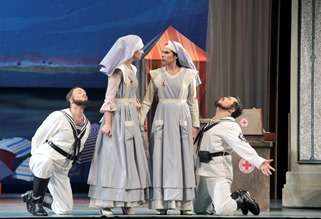|
Back
Cruel Fun on the Riviera Chicago
Lyric Opera
02/17/2018 - & February 21, 26, March, 4, 8, 13, 16*, 2018
Wolfgang Amadeus Mozart : Così fan tutte, ossia la scuola degli amanti, K. 588
Ana María Martínez (Fiordiligi), Marianne Crebassa (Dorabella), Andrew Stenson (Ferrando), Joshua Hopkins (Guglielmo), Alessandro Corbelli (Don Alfonso), Elena Tsallagova (Despina)
Lyric Opera of Chicago Chorus, Michael Black (Chorus Master), Lyric Opera of Chicago Orchestra, James Gaffigan (Conductor)
John Cox (Director), Robert Perdziola (Set Designer), Chris Maravich (Lighting)

(© Cory Weaver)
This production is set in a posh seaside resort – think Cannes, Monte-Carlo, Biarritz or Deauville, at the eve of World War One, rather than 18th century Naples. This shift works thanks to that period’s stylish costumes and the location’s elegance. Yet it was dramatically unconvincing in other ways. For example, in the fake doctor’s intervention to save the lovers, disguised as Albanians, from the fake arsenic, given the references to Mesmerism, la scuola bolognese and the more advanced level of awareness of medicine at the time. However, these were minor flaws. Having the action take place in a hotel works well. After the departure of their fiancés, the sisters volunteer to become nurses, though they somehow remain guests in the posh hotel. The return of Ferrando and Guglielmo as Albanians is not totally convincing, as they do not change much in appearance. However, they did convincingly alter their manner and comportment.
Despite excellent singing, Andrew Stenson as Ferrando lacked charisma. His “Un aura amorosa” was well delivered but lacked emotion. The second act aria, “Tradito, schernito,” was more stirring. Joshua Hopkins’ Guglielmo had more panache, especially in his duet with Dorabella, “Il cor vi dono,” but overall his interpretation was less than exemplary. Even more than Don Giovanni or Le nozze di Figaro, Così fan tutte is the perfect marriage of text and music. One no longer needs to ask the eternal question: “Prima la musica o le parole?” on whether music or the text ought to predominate. Da Ponte’s brilliant text, at least equal to Mozart’s sublime music, requires a sextet of singers that can relish the beauty of the Italian language and give life to the natural grace and irony of the text. Alas, this is a rare feat with non-native speakers of Italian. I recall a performance in a provincial Italian opera house with average young performers that erased from my memory several stellar casts and grandiose productions in leading opera houses. In this production, all singers had sufficiently adequate diction in Italian, but only Alessandro Corbelli as Don Alfonso and Marianne Crebassa as Dorabella had an affinity for the language. Though Don Alfonso has just one short aria, he is the puppet master directing the action of this cruel farce. The veteran singer’s poignant delivery of the biting text in his recitatives set the tone of the performance.
The singers playing the two sisters were vocally and dramatically magnificent. Ana María Martínez was an excellent Fiordiligi, with ease in the upper register. She had no difficulty in the challenging aria “Come scoglio”. Marianna Crebassa’s voice is almost too sensual. One is so captivated that one wishes she would sing the whole time. The timbre is ravishing, honey-toned and with a distinction that is immediately recognizable, a rarity in the homogenized, well-schooled but often non-distinct opera world. Her “Smanie implacabili” was impressive, vocally majestic and dramatically overwhelming. The temperament of the two contrasted wonderfully: Crebassa the playful younger sister and Martínez the poised old sister. Elena Tsallagova was hilarious in the role of the maid, Despina. Her comic impersonation of the doctor in Act I and of the notary in Act II were naturally funny and the nasal exaggeration of the voice was bang on. Her arias “In uomini, sperare fedeltà” and “Una donna a quindici anni” were vocally impeccable and well delivered. Often, Despina has a small voice to contrast with Fiordiligi’s. Tsallagova has an ample lyric soprano, though thanks to her temperament she was the perfect soubrette. The chorus was well directed and conductor James Gaffigan was a singers’ conductor, adjusting the tempi to their needs, never overwhelming their voices. Robert Perdziola’s sets and Chris Maravich’s lighting managed memorably to bring the Mediterranean setting to life.
Ossama el Naggar
|